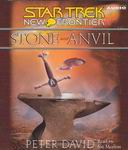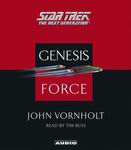
Here are this month’s new releases:
There and Back Again: An Actor’s Tale by Sean Astin with Joe Layden, read by Sean Astin
I’m looking forward to this memoir of Astin’s experience working on the Lord of the Rings trilogy. I’m one of the folks who watched every extra goodie on the massive Extended LOTR DVD’s.
—————————-
Callahan’s Con by Spider Robinson, read by Barrett Whitener
Barrett Whitener read Spider Robinson’s The Callahan Chronicals, which we reviewed on SFFAudio a while back. The Callahan stories are among the most empathic high-quality stories you’ll find in the world of science fiction, and this title is likely no different. The description says that Death himself walks into the bar this time…
Jesse:
I just finished listening to Callahan’s Key, also read by Barrett Whitener. Where you’ve described Robinson’s work as “empathic high-quality stories” I would describe it as “high-functioning fan-fiction”. That isn’t a bad thing, I like the stuff myself, but it certainly won’t be to everyone’s taste.
—————————-
A Coyote In The House by Elmore Leonard
This is a kids book in the tradition of “Call of The Wild” – told from the animal’s perspective.
Jesse:
If nothing else, crime and western writer Elmore Leonard has a great ear for dialogue, so this should be a fun tale with respect to that. But he’s never written juvenile fiction before, so its also unknown territory in some respects.
—————————-
Cally’s War by John Ringo and Julie Cochrane, read by William Dufris and Christine Marshall
A novel by military SF writer and Baen author John Ringo and Julie Cochrane. Cally had been fighting for the future of the human race, but now she is in a war for survival: the survival of her soul…
Paperback Digital has also released several OTR audio dramas on Fictionwise.com: “The Green Hills of Earth” by Robert A. Heinlein, “Drop Dead” by Clifford D. Simak, “Destination: Moon” by Robert A. Heinlein, and “With Folded Hands” by Jack Williamson.
And look for Charlaine Harris’ Vampire Mystery novel Dead Until Dark, which will be released on Halloween. Paperback Digital titles can be purchased on their site (http://www.paperbackdigital.com) or on Fictionwise.
Jesse:
It should also be noted that Paperback Digital has remastered and cleaned up these 1950s era radio dramas. Something which they sorely needed.
—————————-
Legends II: New Short Novels by the Masters of Modern Fantasy, Volume III, edited by Robert Silverberg
This volume of the Legends II series contains stories by two of my favorites: “The Monarch of the Glen” by Neil Gaiman and “The Yazoo Queen” by Orson Scott Card. I’m a fan of the short novel length – there is so much treasure out there in the novella and novelette size. While I’m talking about these, Legends II, Vol. 1 contains “The Sworn Sword” by George R.R. Martin and “Beyond Between” by Anne McCaffrey, and Legends II, Vol 2 contains “Lord John and the Succubus” by Diana Gabaldon and “Indomitable” by Terry Brooks.
Jesse:
I look forward to hearing these! The first Legends anthologies were released by HarperAudio last time. Hopefully Random House Audio will do as good a job.
Star Wars: Jedi Trial by David Sherman and Dan Cragg, read by Jonathan Davis
Random House’s Star Wars titles rival Simon and Schuster’s Star Trek titles in production value and style. If you enjoy Star Wars stories, these books are quite good. Also quite good is Jonathan Davis, who I first heard when he read Neal Stephenson’s Snow Crash.
—————————-
Raketty Tam by Brian Jacques, read by Brian Jacques
A title in the Redwall fantasy series!
Another note from Recorded Books – they have a rental program that looks a lot like Netflix. Unlimited audiobook rentals for $29.99/month. Check it out here.
—————————-
Night of the Living Dead by John Russo and George Romero
An audio drama featuring the original cast!
Dark Tower VII by Stephen King, read by George Guidall
The final volume of Stephen King’s epic series. Stephen King read by George Guidall? Yeah, baby. I’m a Stephen King fan, but have not kept up with this series. I’ve heard “The Gunslinger” and “The Drawing of the Three“, and enjoyed them both – time to start on the rest of them.
—————————-
COMING SOON!
Wil Wheaton, of wilwheaton.net, has published a book called Just a Geek (which is excellent) and I’m thrilled to report that he’s recording an audio version. Wil says the audiobook has some extra asides, and that it’s more like a performance, or director’s cut, than a straight-forward reading. Look for it on his website in the coming weeks! In the meantime, ITConversations has posted audio of Wil’s recent performance at Gnomedex, where he read excerpts from the book.
Jesse:
This sounds like a terrific idea! Wheaton experimented a little with audio blogging a while back – posting to his website by telephone. He’s also read at least one audiobook short story that I know of. It can be found in Dove Audio’s The Greatest Science Fiction Stories of the 20th Century (which is available on Audible.com). The story is called “Why I left Harry’s All Night Hamburgers” by Lawrence Watt-Evans.
—————————-
If you’ve got something you’d like to show up on our monthly New Releases post, write me and let me know. Enjoy, everybody!
Posted by Scott D. Danielson


 Captain’s Blood
Captain’s Blood Star Trek New Frontier: Stone and Anvil
Star Trek New Frontier: Stone and Anvil Alien Voices: The Invisible Man
Alien Voices: The Invisible Man Star Trek: The Next Generation: Genesis Force
Star Trek: The Next Generation: Genesis Force